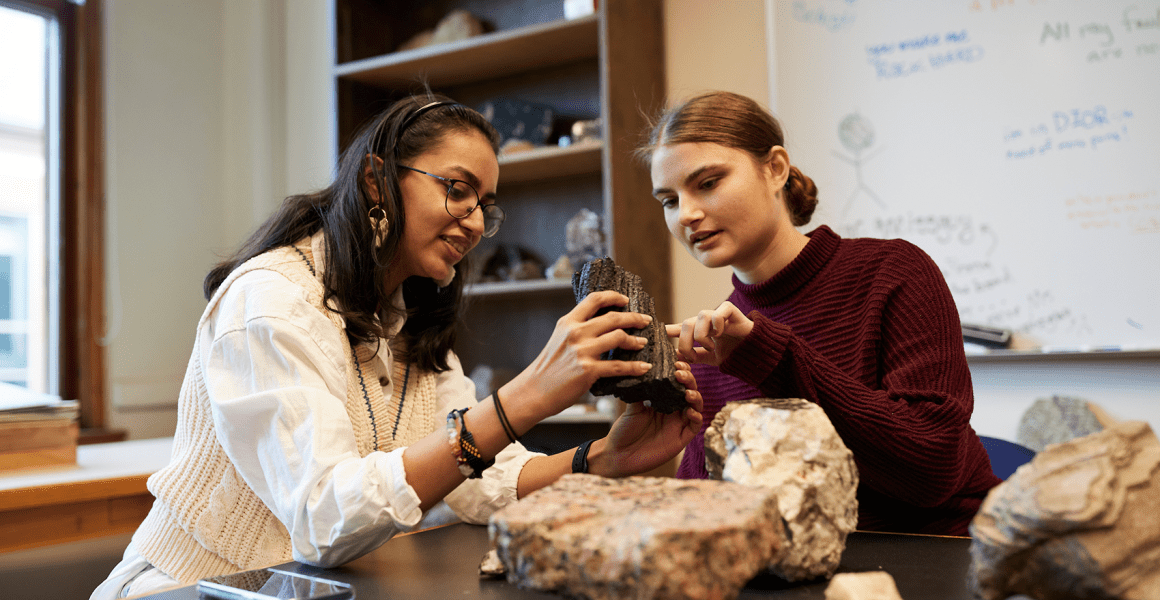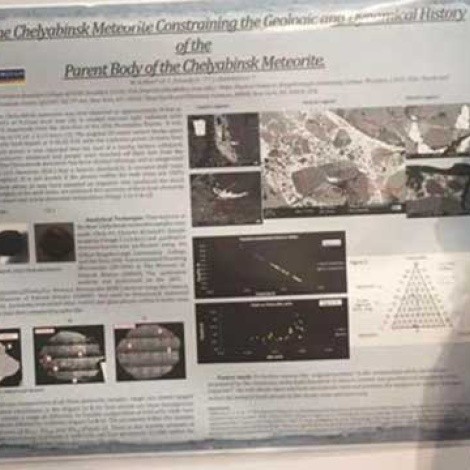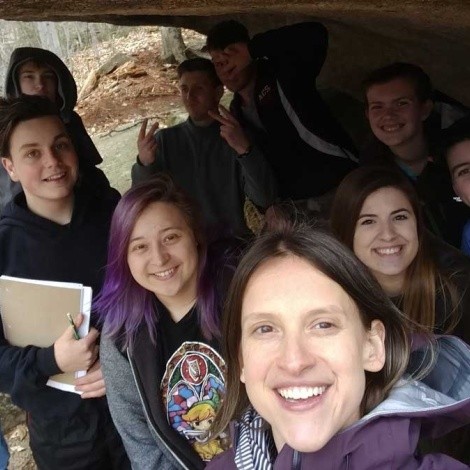GEOL-103 Oceanography
Because more than seventy percent of our planet is covered by oceans, the study of marine systems is crucial to our understanding of Earth History and life on the planet. We will examine chemical, physical, geological, and biological processes in the oceans at a variety of scales in time and space. We will explore how the Earth's oceans formed, how they provided the foundations for life, and how they continue to affect weather and climate, stabilize global chemical cycles, erode coastlines and provide access to resources. We will conclude the semester with a discussion of the human impact on the ocean environment including sea level rise, acidification, coral bleaching and over-fishing.
GEOL-104 Introduction to Geology and Physical Geography
Introduction to Geology and Physical Geography courses are designed to serve first-year students and sophomores interested in exploring the natural sciences. These courses also prepare students for upper-level coursework in geology, physical geography, and the earth, oceanographic, and atmospheric sciences. Students may only take one section of GEOL-104.
GEOL-104DN Introduction to Geology and Physical Geography: 'Dinosaurs'
The first dinosaur fossils recognized in North America were footprints found in South Hadley. One of the most ancient dinosaur species in the United States was discovered close to campus. In this course we will learn the main types of non-avian dinosaurs, compare them to other ancient and modern vertebrates, and explore their physiology and their relationship to birds. To complete the final project, students will select a dinosaur species and study its geological age, geographic distribution, burial conditions, environmental preferences, ecological roles, feeding and reproductive strategies, and body form as they review the history of attempts to reconstruct their adopted dinosaur.
GEOL-104EG Introduction to Geology and Physical Geography: 'Environmental Geology'
The only planet known to sustain life, Earth provides all the resources that sustain us, yet at the same time it can be an unpredictable and sometimes dangerous home. Floods, earthquakes, volcanic eruptions, and other natural processes challenge our ingenuity, while we also contend with self-induced problems such as pollution, desertification, and global climate change. This course examines earth processes, how these affect our lives, and how we can best live with and sustain our environment.
GEOL-104HM Introduction to Geology and Physical Geography: 'Earth As Home'
Earth is our home, and it is essential to understand the planet's geology and physical geography if we aspire to be good planetary stewards. In this course we will learn about the physical structure and constituents of earth. We will consider in detail its rocks, its atmosphere, and its oceans, with particular focus on earth's surface features: their origins, their beauty, and their utility as habitat for humans and other creatures. The primary goal of this course is to give you a sufficient understanding of geology and physical geography to enable you to both appreciate the majesty, and respond to any threats to the integrity of our collective home.
GEOL-105CC Introduction to Geology: 'Climate Change'
This course is about past, present, and future global climate and environmental change. We will discover how the climate system works, how the climate has evolved over geologic time, and what might be in store for us in the future - as human population grows, landscapes are modified and greenhouse gas concentrations increase in our atmosphere. We will study some of the biggest climate events in Earth's history and will come to appreciate how rapid changes currently underway compare to the natural range and pace of climatic variability. The course will provide students with an up-to-date assessment of 1) how the climate system works, 2) to what extent humans are causing climate change, 3) what the consequences of those changes might be, and 4) what can be done to mitigate the most adverse effects of those changes.
GEOL-107 Environmental Geology
The only planet known to sustain life, Earth provides all the resources that sustain us, yet at the same time it can be an unpredictable and sometimes dangerous home. Floods, earthquakes, volcanic eruptions, and other natural processes challenge our ingenuity, while we also contend with self-induced problems such as pollution, desertification, and even global climate change. This course examines earth processes, how these affect our lives, and how we can best live with and sustain our environment. May be taken for 200-level credit with permission of instructor.
GEOL-141 Making the Past: Geosciences in the Makerspace
The great German paleontologist Dolf Seilacher once remarked that "drawing enforces careful observation." As a consequence, Seilacher drew all of the illustrations for his influential scientific publications. Taking Seilacher's insight into three dimensions, in this course we will utilize Mount Holyoke's Makerspace to reconstruct ancient organisms. Studies have shown that well-crafted reconstructions of ancient creatures contribute substantially to improved scientific interpretation of their functional morphology, behavior and paleoecological role(s). We will use Makerspace resources, Pixologic's Sculptris, 3D printing and other tools to improve our understanding of the morphologies and activities of ancient organisms, while gleaning information derived from the rock record to analyze their ancient morphologies and behaviors.
GEOL-201 Rocks and Minerals
In this course you will learn to recognize the common rock-forming minerals and principal rock types, and to understand their origins, properties, associations, and geological significance. Observational skills and hand sample identification will be emphasized in lab.
GEOL-202 History of Earth
This course explores the evolution and interaction of life, rocks, oceans, and air during the past 4 billion years of earth history. Some topics covered are: the geologic time scale, significant events in earth history, ice ages and greenhouse atmospheres, continental drift, extinctions and radiations of flora and fauna, the geology of the anthropocene, and absolute and relative dating of rocks. Oral presentations and writing assignments focus on the design and testing of earth science hypotheses, and critical analysis of recently published research on earth history.
GEOL-203 The Earth's Surface
The surface of the Earth is a history book of past environmental change. Every hill and valley, every erosional feature and every deposit is the result of processes acting at the Earth's surface. In this course we study these processes (e.g. glaciers, rivers, slopes, coastlines, arid regions, frozen ground, cave formation, soil development and groundwater) to understand how they work and to understand the resulting landforms and deposits. With this understanding we can then observe different landforms and deposits and infer past processes (i.e. environments of deposition).
GEOL-210 Plate Tectonics
Plate tectonic theory explains the origins of volcanoes and earthquakes, continental drift, and the locations of mountain belts and oceans. This course focuses on the geometry of plate tectonics. Topics include mid-ocean ridge systems, transform faults, subduction zones, relative plate motion, earthquake analysis, triple point junctions, and stereographic projection.
GEOL-211 Uranium
From the A-bomb to zircon, uranium has revolutionized humanity's destructive potential and wisdom about time. Uranium is the planet's heaviest naturally occurring element, and it transforms by both radioactive decay and nuclear fission. This course explores these two transformations and what we make of them, specifically: nuclear power, nuclear weapons, nuclear wastelanding, radiation and health, and research on deep time. We use modeling to explore high-precision dating of recent geologic and climate events as well as the age of the oldest rocks on earth. Some math is involved. Writing and reading assignments focus on science communication for a general audience.
GEOL-224 Sedimentology
Sedimentary rocks provide us with repositories of fresh water, hydrocarbons, and other critical raw materials, as well as geological evidence for the history of planet earth. This course will introduce students to the study of sedimentary rocks and their environments of deposition, with a focus on the varied processes of sediment accumulation. We will employ the principles of stratigraphic analysis and correlation to interpret ancient environments, paleoclimate, and paleogeography, and use these tools to probe the characteristics of sedimentary basins. Field trips will introduce a variety of analytical techniques used to study sedimentary rocks.
GEOL-226 Oceanography & Marine Science
Most of earth's surface is covered by oceans, giving our "blue marble" a unique look. Oceanic waters make it both nice and dangerous to live near the coasts. We will learn here about oceans by means of key questions. Where did all this water come from? What can we learn about the nature of the seas and their inhabitants? How have these creatures changed oceans through time? How do geology and tectonics determine the depth of an ocean basin? How do marine currents, the Coriolis effect, and strange ice-like substances in the sea floor influence global climate? In this course, we will gain a much-needed, more complete view of our global home.
GEOL-229 Hydrology and Hydrogeology: Hydrological Cycle, Surface, and Groundwater Movement
This course will introduce students to water science where we investigate the hydrological cycle, water distribution on the earth's surface and subsurface at the continental and catchments scale. We will study atmospheric processes such as precipitation, evapotranspiration, and surface runoff to understand how it affects the quantity and quality of potable water availability. Students will learn and practice introductory level groundwater calculations which are mathematical equations that describe the flow and storage of water.
GEOL-295 Independent Study
GEOL-321 The Science of Paleontology
Our understanding of the fossil record is critical for today, as it helps us to comprehend the current state of the planet and its inhabitants. Using a variety of tools and techniques, this course will provide you with a one semester apprenticeship in paleontological science. We will examine the morphology, evolution, survivorship, paleogeography and ecological relationships of ancient organisms. Our subjects will include plants, invertebrate animals, and vertebrate animals, with examples ranging from the Precambrian to the Pleistocene. We will address quantitative questions in paleontology by means of Excel and R Studio.
GEOL-322 Petrology
This course covers mineralogical and chemical compositions, classification, genesis and mode of occurrence of igneous and metamorphic rocks. The structure of the course is a lab course, focusing on the methodology and analytical techniques used to study rock specimens.
GEOL-333 Structural Geology and Orogenesis
This course covers the basic techniques of field geology and structural analysis. Lectures concentrate on field techniques, stress, strain, faulting, folding, rock strength, deformation mechanisms, and multidisciplinary approaches to mountain building (orogenesis). Weekly writing assignments focus on presenting original research and distinguishing between observations and interpretations.
GEOL-334 Historical Geology
This course digs into the geologic time scale in the context of the evolution and interaction of life, sediments, rocks, oceans, and air during the past few billion years. Some topics covered are: ice ages and greenhouse atmospheres, continental drift, extinctions and radiations of flora and fauna, the early evolution of earth, and absolute and relative dating of rocks. Students collaborate during class meetings to develop a nuanced understanding of the data and methods that define the geologic time scale in scientific literature. A final exam involves memorization of the geologic time scale and significant events in earth history.
GEOL-342 Seminar in Geology
Seminars offer directed study and discussion of one or more selected topics in geology. Topics vary from year to year. Consult the department for information about future seminars.
GEOL-342CC Seminar in Geology: 'Global Effects of Climate Change'
Climate change is shifting the historical climate due to temperature increases and changing weather patterns. Historical monitoring of atmospheric gases has shown that anthropogenic contributions since the Industrial Revolution are the leading causes. Today, the effects of climate change vary by location and are most visible in weather patterns, where some locations are becoming wetter or dryer. The global temperatures of land surfaces and oceans have increased over time, and these shifts have also directly affected biodiversity and human activity. This discussion-based seminar aims to cover peer-reviewed articles on the effects of climate change in different regions of the world.
GEOL-342PC Seminar in Geology: 'Paleoclimatology: Trees, Sediments, and Natural Disaster'
Paleoclimatology -- the study of past climates -- is a multidisciplinary field that integrates geological, geochemical, geophysical, and biological tools to interpret Earth's climate history and the processes that have shaped it. This course examines how climate-related events are recorded in the floodplain sediments of the Connecticut River and how surrounding tree populations have responded to local and regional climate change. Using data from local weather stations and historical archives, students will analyze climate trends over the past century. This course emphasizes research- and discussion-based approach, engaging students in geological investigations that include literature review, field sampling, laboratory analysis, data interpretation, hypothesis testing, and public presentation.
GEOL-342SR Seminar in Geology: 'Sustainable Resources'
Have you ever wanted to know where the materials in your phone came from? Or the gemstones in your jewelry? How about the environmental impacts of extracting those resources from the Earth? Or the human impacts? In this seminar, we will explore mining of minerals and gems, as well as the environmental cost of that extraction and use, with an eye to making Earth material resources more sustainable.
GEOL-395 Independent Study




